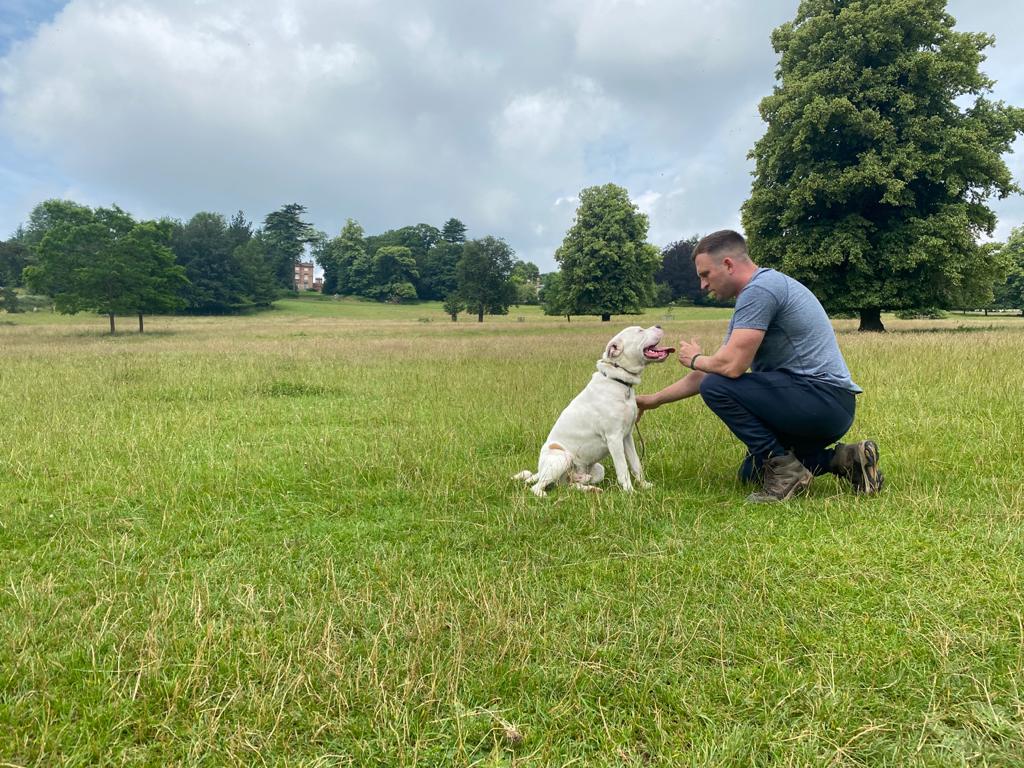Have you ever wondered why you catch your dog’s eating grass? Most dogs
eat it as and when they please, but others munch it down when the need to
arises. Do you wonder if it means something might be wrong, or could it be
one of those random dogs behaviours? Your dog may just simply do it
because they are bored, but there are also some health-related reasons for
eating grass you may want to know about.
Dogs eat grass from time to time but why do they? Sometimes, dogs who eat
grass may be trying to relieve digestive tummy upset.
They may also be seeking certain nutrients or plant compounds that offer
health benefits. If your dog regularly eats large amounts of grass, make an appointment with your veterinarian, and consider upgrading their diet to help provide all the nourishment his or her body needs
Why Dogs Eat Grass
While grass is not a primary food source for dogs, it is for other species,
so while I don’t classify nibbling grass as pica, I do recommend owners
evaluate their dogs’ intestinal health and nutritional status, if the behavior becomes obsessive. The activity can be a sign of boredom or a way to pass the time for some dogs; for others, it’s a fun and rewarding behavior. However, there are also certain health-related reasons dogs eat grass.
While grass is not a primary food source for dogs, it is for other species,
so while I don’t classify nibbling grass as pica, I do recommend owners
evaluate their dogs’ intestinal health and nutritional status, if the behavior becomes obsessive. The activity can be a sign of boredom or a way to pass the time for some dogs; for others, it’s a fun and rewarding behavior. However, there are also certain health-related reasons dogs eat grass.
- To balance the microbiome — Many types of grass contain
beneficial prebiotic fiber that may help keep your dog’s intestinal
flora balanced and resilient. - To relieve gastrointestinal (GI) upset — Many dogs with an
upset tummy consume certain types of grass because they
instinctively know it will make them throw up. There seems to be
something about the texture of some types of grass that triggers
vomiting or a bowel movement in many dogs, which relieves
their discomfort.If this is the situation with your dog, he’ll probably seem almost
frantic to get outside to start gobbling up the nearest patch of
grass. The intensity of grass consumption for the purpose of
vomiting is usually strong and the grass chosen appears to be
less important. If the “cure” works, at some point he’ll quit
chewing, lick his lips (a sign of nausea in dogs), and throw up.This is normal behavior for canines (who are, by design,
scavenging carnivores and indiscriminate eaters) and nothing to
be concerned about unless it happens more than once or twice a
year. It’s nature’s way of helping dogs get rid of toxins from their
bodies and bring their GI tracts back into balance.Dogs who ingest grass to throw up are usually not selective
about what grass they consume; they just want to induce
vomiting and feel better. However, many healthy dogs with
healthy guts will seek out specific grasses and are quite selective
about what species they’re looking for. - To eliminate intestinal parasites — Chimpanzees consume
plant material to increase intestinal motility to rid their bodies of
intestinal parasites. It’s possible dogs eat grass for a similar
reason. - To fulfill specific nutrient requirements — In a 2008 study,
researchers found that grass eating in domestic dogs is a normal
tendency. This might be an inherited behavior, since wildcanines eat entire prey animals, including the entrails (guts),
which typically contain digested plant matter.It’s possible the grasses your dog likes to munch contain
nutrients her body lacks. Grass is an abundant source of fiber.
As a living green food, it contains phytonutrients, is high in
potassium and chlorophyll, and is also a pretty good source of
digestive enzymes. Your dog could be seeking out selective
grasses to make up one or more deficient nutrients or to gain
bioactive substances she’s not currently getting in her diet.
When to Worry
If your dog’s grass eating is chronic and especially if it causes her to
vomit frequently, it’s time to make an appointment with your
veterinarian.
In the meantime, I recommend upgrading her diet if she’s still eating
kibble or any non-human grade commercial dog food. Most healthy dogs
fed a nutritionally optimal, species-specific diet don’t routinely consume
an abundance of grass because they receive all the nourishment their
bodies need from their food, and they rarely suffer from digestive issues.
Adding probiotics and digestive enzymes can also benefit dogs with
“sensitive stomachs.”
If you’re sure your dog is receiving optimal nutrition from her diet and
her microbiome is healthy, but she still eats a significant amount of
grass, consider growing your own sunflower sprouts. Sprouts can
provide an easy, inexpensive source of fresh, live, organic vegetation
and are much more nutritious than grass.
If your dog is selective about the grass she eats, choosing tall, broad
grasses to nibble (the kind that typically grow along a fence line or
between cracks in the sidewalk) and then moves on, she’s most likely
eating grass because she wants to or because she’s seeking the
nutritional or digestive benefits it provides. There’s no cause for concern
if you’re sure the grass she’s sampling is free of pesticides, herbicides,
and other contaminants.



